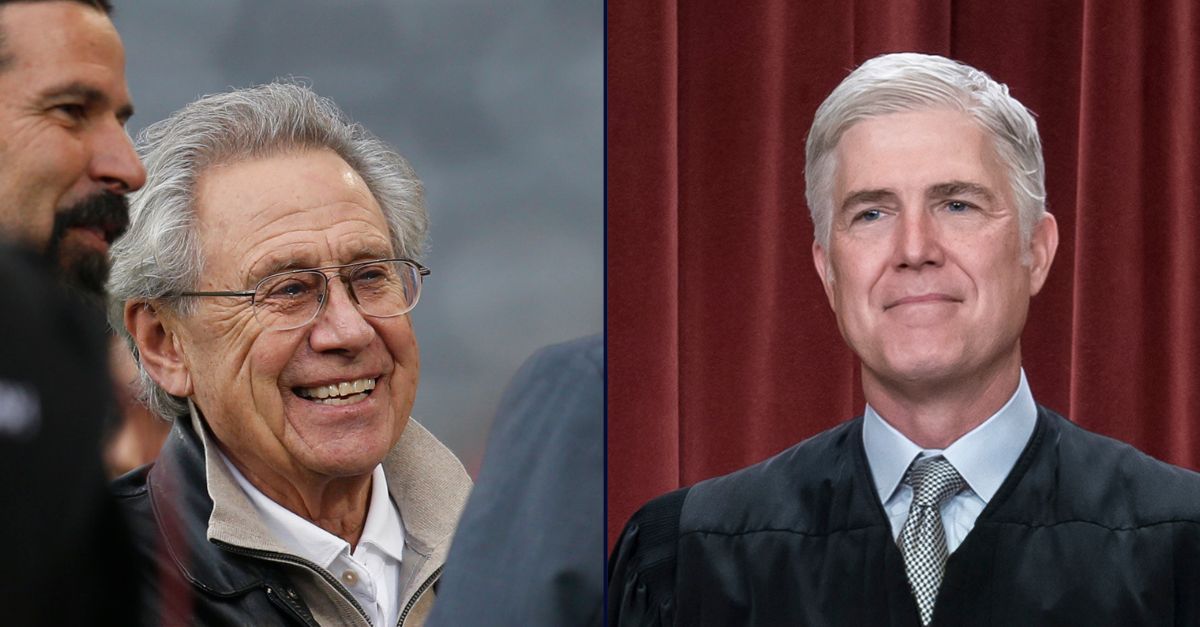
Left: Los Angeles Galaxy owner Philip Anschutz, center, chats with head coach Bruce Arnea, front, and Marcelo Balboa, announcer for the Colorado Rapids, before the Galaxy face the Rapids in the first half of a MLS soccer game Saturday, March 12, 2016, in Commerce City, Colo. (AP Photo/David Zalubowski); Right: Supreme Court Justice Neil Gorsuch (Erin Schaff-Pool/Getty Images).
According to a letter released Wednesday by Scott Harris, clerk of the U.S. Supreme Court, Justice Neil Gorsuch will no longer participate a case involving a proposed 88-mile oil and gas rail line in Utah. Gorsuch was asked to recuse himself from the case due to his past relationship with conservative oil billionaire Philip Anschutz. The justice, however, did not specify his reasons for recusal.
In the past, calls for Gorsuch to sit out on environmental cases due to his relationship with Anschutz went unanswered, despite Anschutz’s potential to reap major financial benefits from the outcomes of the cases.
Gorsuch arguably has Anschutz to thank for his appointment to the Supreme Court; Gorsuch worked at the law firm that represented the billionaire for over a decade, and Anschutz successfully lobbied the George W. Bush administration to nominate Gorsuch as a federal circuit judge for the U.S. Court of Appeals for the 10th Circuit.
While he was serving on the 10th Circuit, Gorsuch and Anschutz remained connected as Gorsuch would give speeches at Anschutz’s annual dove-hunting retreats at his ranch. Further, just before Gorsuch was appointed to the Supreme Court in 2017, The New York Times reported that he “has been partners in a limited-liability company with two of Mr. Anschutz’s top lieutenants,” and that together, the group built a vacation home on 40 acres along the Colorado River.
Many have speculated that the ties between the two men are connected to Gorsuch’s long quest to end Chevron deference, which culminated in success last June.
In October, a number of watchdog groups sent a letter to Chief Justice John Roberts outlining their concerns:
The cozy relationship between Philip F. Anschutz and Justice Gorsuch far surpasses the standard of “reasonably-questioned impartiality” for the federal recusal statute. This relationship that creates a conflict of interest is just the latest example of countless violations in the years-long Supreme Court ethics crisis. Lasting accountability and reform are needed to restore integrity back into the nation’s highest Court.
In November 2023, all nine justices signed on to a code of ethics that requires, among other things, justices to uphold the independence of the federal judiciary, avoid outside influence, and recuse themselves in cases to which they are personally connected. The code has been sharply criticized for containing no enforcement mechanism.
The case from which Gorsuch has agreed to recuse himself is Seven County Infrastructure Coalition v. Eagle County, Colorado, which asks the justices to resolve a circuit split about the scope of the National Environmental Policy Act (NEPA). The case involves the Uinta Basin Rail project, a way of transporting oil to ports and refineries, which was approved by the Surface Transportation Board (STB) to start in 2021. The STB is an independent federal agency that primarily handles economic regulation of surface transportation, primarily freight rail.
The approval was challenged on the basis that the environmental review that had been done was incomplete and overlooked various kinds of environmental damage as well as risk of accident. Although STB does not regulate oil production, the challengers argued that the agency was required to consider the environmental effects under the analysis required by NEPA. The challengers prevailed and the approval was overturned. Seven County Infrastructure Coalition appealed the ruling, and argued that the STB exceeded its authority and that NEPA does not require the analysis at issue. The justices took up the case over the objection of the Biden Administration.
The groups argued that Anschutz would benefit from a favorable ruling in two key ways: first, the proposed railway would likely service Anschutz oil wells, and second, any rolling back of NEPA would mean that Anschutz would incur fewer regulatory costs for his private oil company.
Oral arguments before the justices are scheduled for the case on Dec. 10.







